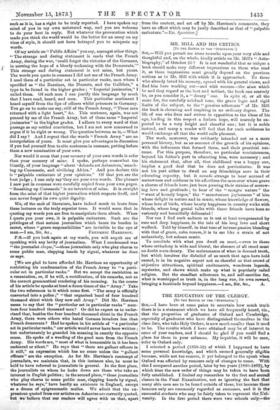MR. MILL AND HIS CRITICS.
[TO THB EDITOR OF THR "SPECTATOR.')
SIB, —Will you permit me some remarks upon your very able and thoughtful and, on the whole, kindly article on Mr. Mill's " Auto- biography," of October 25? It is not wonderful that so unique a book should make very different impressions on those who read it, as those impressions must greatly depend on the previous notions as to Mr. Mill with which it is approached. To those who already loved his memory, agreed with his general views, and find him here working out—and with success—the aims which he and they regard as the best and noblest, the book can scarcely be, as you consider it, a " dreary " one. In spite of, or all the more for, the carefully subdued tone, the grave logic and rigid limits of the subject, to the " genuine adherents " of Mr. Mill the book is elevating and inspiring in no ordinary degree. The life of one who lives and strives in opposition to the ideas of his age, leading in this respect a forlorn hope, will scarcely be ex- pected to be a very .bright and cheerful one ; but it is noble instead, and many a reader will feel that for such nobleness he would exchange all that the world calls pleasant.
The work, moreover, was evidently intended not as a mere personal history, but as an account of the growth of his opinions, with the influences that formed them, and their practical out- come. For this purpose, therefore, no particular reminiscences, beyond his father's part in educating him, were necessary ; and his statement that, after all, that childhood was a happy one, implies a good deal that he does not particularise. It was not his part either to dwell on any friendships save in their educating capacity, but it sounds strange to hear accused of narrowness and coldness in his affections the man over whose grave a chorus of friends have just been pouring their strains of sorrow- ing love and _gratitude ; to hear of the " meagre nature " the "want of homely hopes," the "monotonous joylessness" of him whose delight in nature and in music, whose knowledge of flowers, whose love of birds, whose hearty happiness in country walks with friends, whose long genial talks with those friends have been so variously and beautifully delineated
Nor can I find such sadness as is not at least compensated by rare and deep happiness, in the tale of his long love and short wedlock. Told by himself, in that tone of intense passion blending with that of grave, calm reason, it is to me like a strain of not melancholy, but solemn music.
To conclude with what you dwell on moat, —even to those whose orthodoxy is wide and liberal, the absence of all creed must no doubt seem dreary. The maintenance of what is deemed truth, but which involves the disbelief of so much that ages have held sacred, is in its negative aspect not so cheerful as that crowd of objective attractions, spiritual excitements, wondrous legends, mysteries, and shows which make up what is popularly Galled religion. But the steadfast adherence to, and self-sacrifice for, what is worshipped as truth is, in the long run, its own reward, bringing a beatitude beyond happiness.-1 am, Sir, 8na., A.


































 Previous page
Previous page